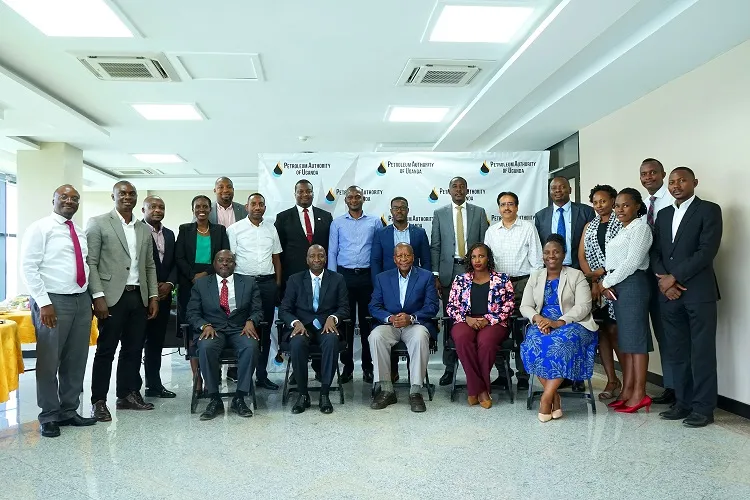
The governing board of the Uganda Chamber of Mines and Petroleum (UCMP) and the Petroleum Authority of Uganda Officials shortly after a recent meeting to discuss issues on how National Participation of Ugandan companies can be enhanced in the oil and gas sector
The Petroleum Authority of Uganda (PAU) has sanctioned contracts valued at approximately USD 7.16 billion.
According to PAU, part of this money, nearly USD 1.8 billion (equivalent to UGX 7 trillion) worth of contracts has been allocated to Ugandan companies and these contracts are currently at various stages of execution.
This comes a year after the announcement of the Final Investment Decision (FID) last year [February 2022]
The Manager of Corporate Affairs at PAU, Ms. Gloria Sebikari anticipates a surge in contract numbers once construction begins on the East African Crude Oil Pipeline (EACOP).
“Most of the contracts awarded thus far are in the upstream sector, but we expect an increase in both the number and value of contracts for Ugandan firms once EACOP enters full-scale construction.” Ms Sebikari said March 21 in Kampala.
In a bid to maximize the benefits from ongoing oil and gas activities, the PAU is updating its National Suppliers Database (NSD), urging entities and individuals interested in supplying goods and services to the sector to register. In February 2024, 113 entities applied, comprising 97 Ugandan entities and sixteen foreign entities.
The NSD is published annually on the Authority’s website, and companies are required to renew their registration every three years. The NSD 2024 currently has over 3,000 qualified entities with 2,389 Ugandan and 612 Foreign.
Over 360 companies have been awarded contracts directly from licensed oil companies (Tier 1 contractors), with 300 of these being Ugandan entities, accounting for 83% of the total. Additionally, more than 1,400 companies have secured contracts from the Tier 1 contractors (Tier 2 subcontractors), while several others were engaged at the Tier 3 level.
The Director Economic and National Content Monitoring at PAU, Ms. Peninah Aheebwa, emphasised the prioritisation of National Content with a focus on value retention.
“We aim to retain as much value as possible within the country. In instances where Ugandans lack the requisite skills and experience, we encourage them to form Joint Ventures (JVs) to compete for contracts at various project development stages,” she said
She explained that a total of 120such joint ventures were reviewed and 54 (45%) have been approved by the PAU to undertake several contracts awarded and that the cumulative value awarded to JVs since the announcement of the FID stands at US$260 million.
She said regarding employment, the sector currently employs 13,067 individuals, with 11,752 (90%) being Ugandans adding that Licensees directly employ 1,018 persons, of whom 68% are Ugandans, while contractors and subcontractors employ 12,049, with 92% Ugandans, including 4,442 from local communities.
According to PAU, 554 small and medium-term enterprises have received training on identifying and participating in business opportunities in the oil and gas sector since 2021 and that this was under a US$ 500,000 Business Linkages Project undertaken in partnership with the African Development Bank (AfDB).
This was particularly implemented in the EACOP districts of Mubende, Kyankwanzi, Masaka, Kyotera, Sembabule, Kikuube, Rakai, Hoima, Gomba, and Kakumiro.
Ms Ahebwa revealed that the challenges encountered in implementing national content in the country’s oil and gas sector include limited skilled manpower in some professions and enterprises, inadequate affordable and patient capital, extended payment periods, and geopolitical tensions affecting supply chains.
According to Ms. Aheebwa, the Authority is engaging relevant stakeholders to ensure compliance with the legal requirements, payment of arrears for contractors, and enhancing the skills of individuals and enterprises. Significant progress is continuing to be made in addressing these challenges.
Reports from PAU also indicate that the regulatory framework is also being reviewed to ensure it provides deterrent measures to emerging issues like delayed payments, among others, and that the banking and finance sector is also working with industry players to address the challenges related to inadequate capital.
Ms. Aheebwa reaffirmed PAU’s commitment to enhancing national participation in Uganda’s oil and gas activities and collaborating with all stakeholders to ensure value creation and retention from oil and gas activities in the country.







